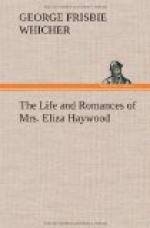[26] See the Dedication to The Fatal Secret (1724). “But as I am a Woman, and consequently depriv’d of those Advantages of Education which the other Sex enjoy, I cannot so far flatter my Desires, as to imagine it in my Power to soar to any Subject higher than that which Nature is not negligent to teach us. “Love is a Topick which I believe few are ignorant of; there requires no Aids of Learning, no general Conversation, no Application; a shady Grove and purling Stream are all Things that’s necessary to give us an Idea of the tender Passion. This is a Theme, therefore, which, while I make choice to write of, frees me from the Imputation of vain or self-sufficient:—None can tax me with having too great an Opinion of my own Genius, when I aim at nothing but what the meanest may perform. “I have nothing to value myself on, but a tolerable Share of Discernment.”
[27] See the Preface to The Injur’d Husband quoted in Chap. IV.
[28] Preface to The Memoirs of the Baron de Brosse (1725). A similar complaint had appeared in the Dedication of The Fair Captive (1721). “For my own part ... I suffer’d all that Apprehension could inflict, and found I wanted many more Arguments than the little Philosophy I am Mistress of could furnish me with, to enable me to stem that Tide of Raillery, which all of my Sex, unless they are very excellent indeed, must expect, when once they exchange the Needle for the Quill.”
[29] See a poem by Aaron Hill, To Eliza upon her design’d Voyage into Spain (undated), Hill’s Works, III, 363. Also The Husband, 59. “On a trip I was once taking to France, an accident happen’d to detain me for some days at Dover,” etc. Mrs. Haywood’s relations with Hill have been excellently discussed by Miss Dorothy Brewster, Aaron Hill (1913), 186.
[30] The first of these was a translation of the Chevalier de Mouhy’s best known work, La Mouche, ou les Aventures et espiegleries facetieuses de Bigand, (1730), and may have been done by Mrs. Haywood herself. The second title certainly savors of a typical Haywoodian production, but I have been unable to find a copy of these alleged publications. Neither of them was originally published at the Sign of Fame, and they could hardly have been pirated, since Cogan, who issued the volume wherein the advertisement appeared, was also the original publisher of The Busy-Body. The Anti-Pamela had already been advertised for Huggonson in June, 1741, and had played a small part in the series of pamphlets, novels, plays, and poems excited by Richardson’s fashionable history. If Mrs. Haywood wrote it, she was biting the hand that fed her, for The Virtuous Villager probably owed its second translation and what little sale it may have enjoyed to the similarity between the victorious virgin and the popular Pamela.
[31] B.M. (MSS. Sloane. 4059. ff. 144), undated.




